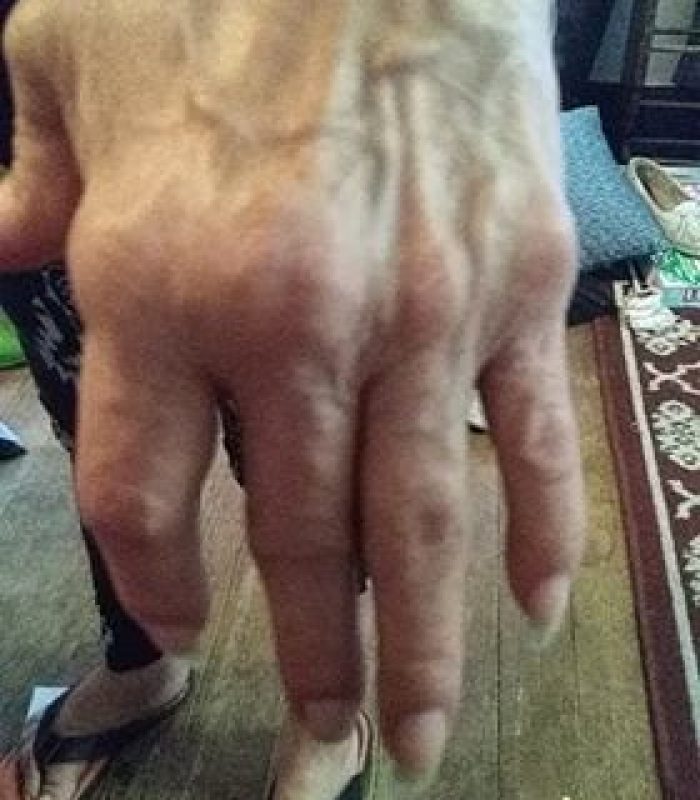Nail Patella Syndrome is a painful condition that causes bones and joints to weaken over time.
My name is Denise, and I was born with a rare genetic disease called Nail Patella Syndrome. It’s so rare that most doctors don’t know of it. Also, it’s so rare that many of them do not want to even invest the time to know!
Unfortunately, it’s a degenerative condition, so as I get older my bones and joints begin to weaken. This means I am constantly battling pain throughout my body. Some days are hard to just move, or to even get out of bed.
Terrible Joint Pain From Nail patella Syndrome
I have a partial knee cap, which if I fall on… OMG! The pain is so intense! My elbows do not go straight or bend fully. So lifting heavy objects is a painful task.
As a child, I was luckier than others with NPS and as a result, I am healthier than others. I’ve never had any surgeries, or even broken a single bone. I’m 52 years old now and have many more years to live!
There are other medications available, but medical cannabis is the ONLY medicine that actually keeps me mostly pain free!! I also fear these other meds due to the high risk I have of kidney disease (also due to Nail Patella Syndrome).
I love my life, and I plan to live it to the fullest extent!!! Nail Patella Syndrome don’t stop me! (Yet).
From RxLeaf: A Rare Genetic Condition with Painful Symptoms
Although rare, Denise is not the only one with this genetic condition. Nail Patella Syndrome (other names include, Fong disease, hereditary onychoosteodysplasia (HOOD), and Turner-Kieser syndrome) affects roughly one in 50,000 people. It is a congenital condition passed down through families.
As a genetic disorder, there is no cure for Nail Patella Syndrome and no way to reverse the skeletal defects which come from the mutation of the LMX1B gene. Physicians typically diagnose a patient at birth or in early childhood based on a list of common symptoms.
Almost all patients with this disorder have nail abnormalities. Many also have deformed kneecaps and elbows, which may be only partially formed or missing altogether. Some patients also have horn-like bone growths on their pelvic bone, or like Denise, kidney issues. Another common symptom of people with Nail Patella Syndrome is glaucoma (ocular eye pressure).
Beyond surgical intervention to correct or replace skeletal deformities, treatment is mainly targeting pain. Treatment options are “symptomatic and supportive,” according to the National Organization of Rare Disorders.
Cannabis Provides Pain Relief for Those with Genetic Conditions
According to Dr. Alan Shackelford of Amerimed of Colorado, “Severe pain due to joint malformations and instability is common in nail-patella syndrome, and treatment is typically to try to reduce the severity of the symptoms, to reduce the pressure within the eye if the patient has glaucoma, and to prevent any kidney problems from progressing to renal failure.” He points out that cannabis is capable of treating both chronic pain and glaucoma.
With no cure for the skeletal deformities caused by genetic conditions, patients like Denise must target the symptoms. As Dr. Shackelford details, cannabis is effective for pain relief and especially useful for targeting chronic pain.
The plant has a long history of use for pain, and now, a growing body of research supports this historical application. Broadly speaking, cannabis effectively targets cancer pain, inflammatory pain, neuropathic pain, and more.
Improving quality of life is the primary goal for patients with rare conditions like Nail Patella Syndrome. Chronic pain impacts physical and mental health, and it is, therefore, a primary target to improve the overall quality of life. There are no studies yet on the use of cannabis for the pain associated with Nail Patella Syndrome, but there are many studies on cannabis for the use of chronic pain.
Cannabis Offers Potential
Unlike opioids, many patients consider cannabis an effective, safe, and low-risk, treatment option for the long term use of chronic pain. Considering patients with Nail Patella Syndrome will likely be in some pain for the majority of their life, it’s a valuable option to have on the table.
Here’s one example: “The Effect of Medicinal Cannabis on Pain and Quality-of-Life Outcomes in Chronic Pain,” published in 2016. This was an open-label study “to determine the long-term effect of medicinal cannabis treatment on pain and functional outcomes in participants with treatment-resistant chronic pain.” [1]Haroutounian, S., Ratz, Y., Ginosar, Y., Furmanov, K., Saifi, F., Meidan, R., & Davidson, E. (2016). The Effect of Medicinal Cannabis on Pain and Quality-of-Life Outcomes in Chronic Pain. The … Continue reading
While uncontrolled, this study discovered that long term cannabis use for chronic pain reduced pain scores and pain interference. It also improved social and emotional disability scores among the participants. Out of the more than 200 initial participants, only two dropped out due to adverse reactions. Opioid therapies would be hard-pressed to present such positive results.
This study, among others looking at cannabis and chronic pain, is quite convincing. Cannabis, even when used for long term treatment, can improve quality of life across several vital areas, from emotional to social to the physical experience.
Opioids Not a Suitable Option for Nail Patella Syndrome
How do opioids impact a patient’s quality of life when used long term? Surprisingly we don’t know. There are few long term clinical trials on opioids which follow participants for more than a year. As per a 2017 systematic review with meta-analysis published in Quality of Life Research, “long-term opioid trials are rare and only two trials included lasted longer than 1 year.” [2]Thornton, J.D., Goyat, R., Dwibedi, N. et al. Health-related quality of life in patients receiving long-term opioid therapy: a systematic review with meta-analysis. Qual Life Res 26, 1955–1967 … Continue reading
With the opioid crisis now sweeping across America, and around the world, we know the issues with long term use of this deadly prescription. Patients are at increasingly higher risks of addiction, the longer they continue to use.
In the 2017 review mentioned above, the authors found only “small, statistically significant improvements” to something called the Physical Component Summary. There were small but not statistically relevant changes to the Mental Component Summary. Both of these are a part of the Health-Related Quality of Life score, essentially a common method that researchers tackle the complicated question of quality of life.
In their discussion, the authors note two significant problems with the study of opioids’ impact on a patient’s quality of life. First, the mean length of the trials included in this review was only 15.3 weeks. That’s less than four months. Second, their review “highlights the brevity of randomized controlled trials for opioids designed and marketed to be used long term as well as the limited outcome reporting when it comes to [Health-Related Quality of Life] measures.”
More Patients Than Ever Trying Cannabis
So although opioids are designed and marketed for long term treatment of chronic pain, there is a lack of information on how they impact quality of life over the long term. A serious problem for patients like Denise who may require lifelong treatment.
Cannabis is safer and often preferred for chronic pain. It has a lower risk of addiction, no risk of death by overdose, and few known long term side effects. Patients with Nail Patella Syndrome, or with other painful genetic skeletal deformations, may want to explore the option of medical cannabis with their physician.
References








elizabeth christie
I too was born with nail patella syndrome . It has been in my family for generations . The worst pain is not in the knees [though they hurt all the time ] but in my lower legs . I have never understood the mechanism behind this pain but now think it is a type of sensory neuropathy : posh way of saying there is a dysfunction in the part of the nervous system that sends sensation-messages to the brain , eg hot,cold ,sharp, ticklish , painful . It is worse at night , my legs feel heavy and I do not like the weight of the duvet on them or the pressure of the bed underneath. there is a burning dull ache which keeps me awake and I am exhausted in the morning . I have had this for 67 years ….but not anymore ! I started to use a cbd product a few days ago : it is in a base of coconut oil and came from natureambassador.com . I so far have not taken it by mouth but rub it into my lower legs and knees . The effect has been miraculous -so much so I am dating the beginning of the rest of my life from last week . I am sleeping unbelievably well now that I am no longer wrestling with the pain at night .I am not sure how many other people with nps have that type of pain but ”sensory neuropathy ” is in the list of symptoms and it does not happen on the rare occasions when my knees stop hurting so it is all linked in .